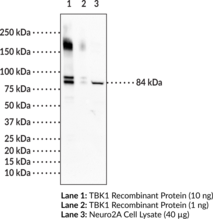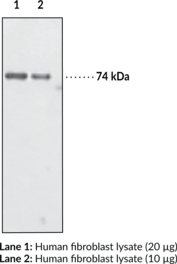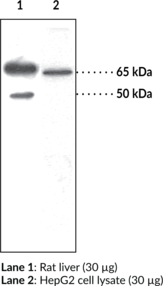Description
TANK-binding kinase 1 (TBK1) is a non-canonical inhibitor of NF-κB kinase (IKK) that has an essential role in regulating inflammatory responses to pathogens.{35096} Following activation of toll-like receptors by viral DNA, TBK1 interacts with various partners such as STING, MAVS, and TANK to phosphorylate and activate interferon regulatory factors (IRFs) 3 and 7 as well as DEAD-box helicase 3 X-linked (DDX3X), which leads to transcriptional activation of pro-inflammatory and antiviral genes including interferon (IFN) subtypes α and β.{35096,35098} TBK1 induces nuclear translocation of NF-κB to initiate a pro-inflammatory response via phosphorylation of NF-κB inhibitor α (NFκBIα), IKKβ, or NF-κB p65 subunit (RelA).{35099} Cytosolic localization of E. coli, Salmonella, and S. pyogenes increases in TBK1-/- murine embryonic fibroblasts, macrophages, and epithelial cells, suggesting TBK1 maintains vacuolar integrity, which is critical to bacterial clearance.{35095} TBK1 phosphorylates the autophagy receptor optineurin to enhance binding of ubiquitin-like microtubule-associated protein light chain 3 (LC3) modifiers and induce autophagic clearance of S. enterica.{35097} It also binds to severe acute respiratory syndrome coronavirus 2 (SARS-CoV-2) non-structural protein 13 (Nsp13), a helicase-triphosphatase and component of the viral replicase-transcriptase complex.{55024} Cayman’s TBK1 Monoclonal Antibody (Clone 4E6) can be used for ELISA, Immunohistochemistry (IHC), and Western blot (WB) applications. The antibody recognizes TBK1 at approximately 84 kDa.
Synonyms: NF-κB-Activating Kinase|Serine/Threonine-Protein Kinase TBK1|TANK-Binding Kinase 1
Immunogen: Full length human recombinant TBK1 protein
Formulation: 100 µg of protein G-purified monoclonal antibody
Isotype: IgG1
Applications: ELISA, IHC, and WB
Origin:
Stability: 365 days
Application|ELISA||Application|Immunohistochemistry||Application|Western Blot||Product Type|Antibodies|Monoclonal Antibodies||Research Area|Cell Biology|Cell Signaling|NF-κB Signaling||Research Area|Cell Biology|Endomembrane System & Vesicular Trafficking|Autophagy||Research Area|Epigenetics, Transcription, & Translation|Transcription Factors||Research Area|Immunology & Inflammation|Autoimmunity||Research Area|Immunology & Inflammation|Innate Immunity|Pattern Recognition||Research Area|Immunology & Inflammation|Innate Immunity|STING||Research Area|Immunology & Inflammation|Pulmonary Diseases|COVID-19||Research Area|Infectious Disease|Bacterial Diseases|Food-borne Illnesses||Research Area|Infectious Disease|Bacterial Diseases|Typhoid||Research Area|Infectious Disease|Viral Diseases|Coronaviruses



